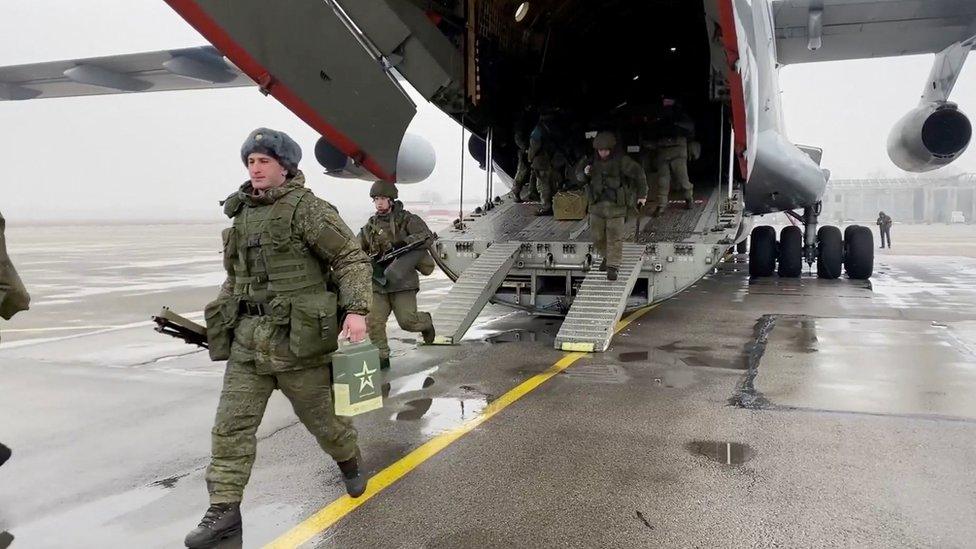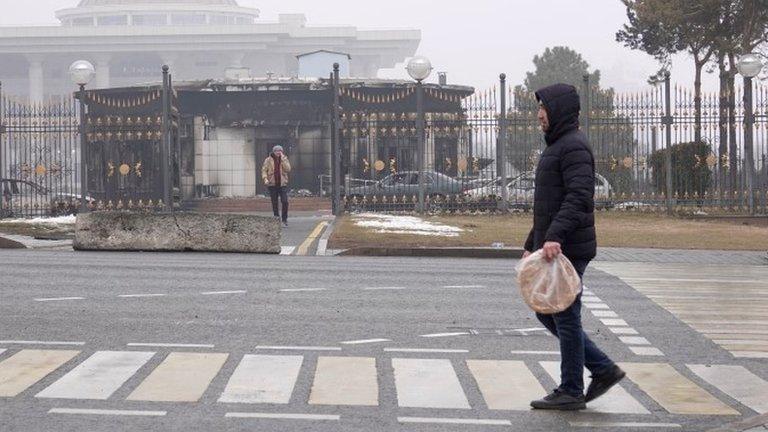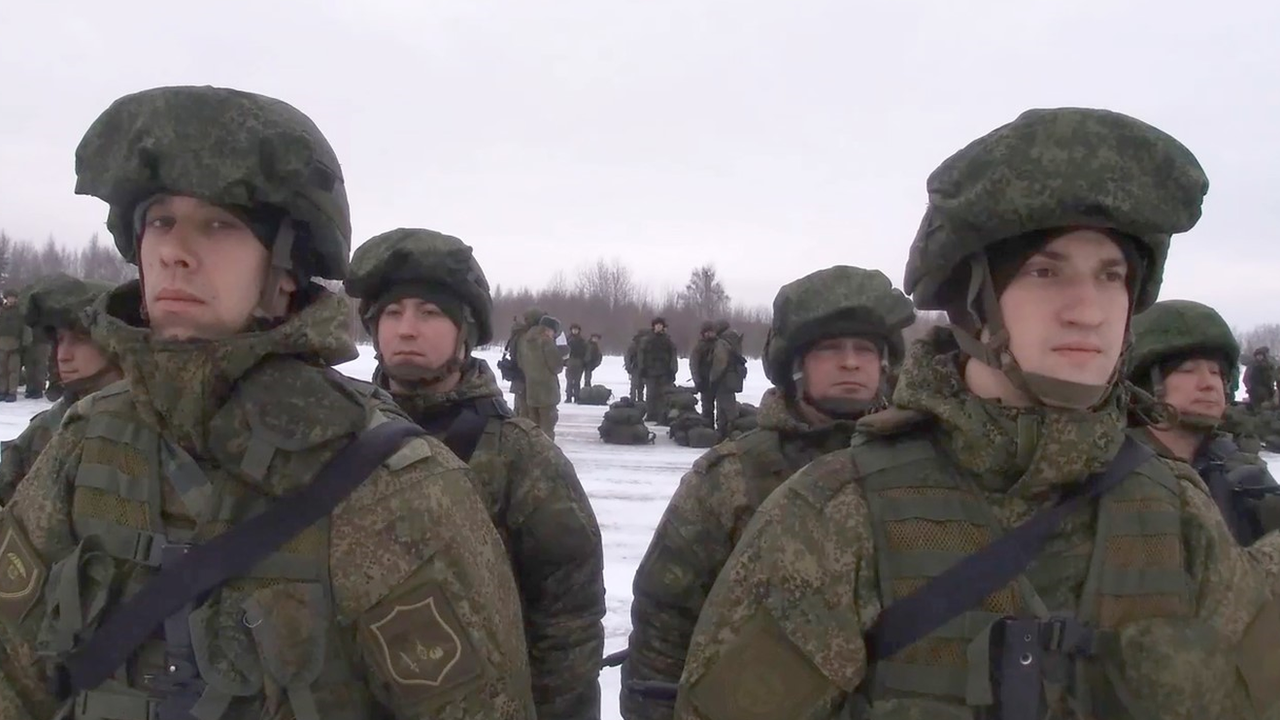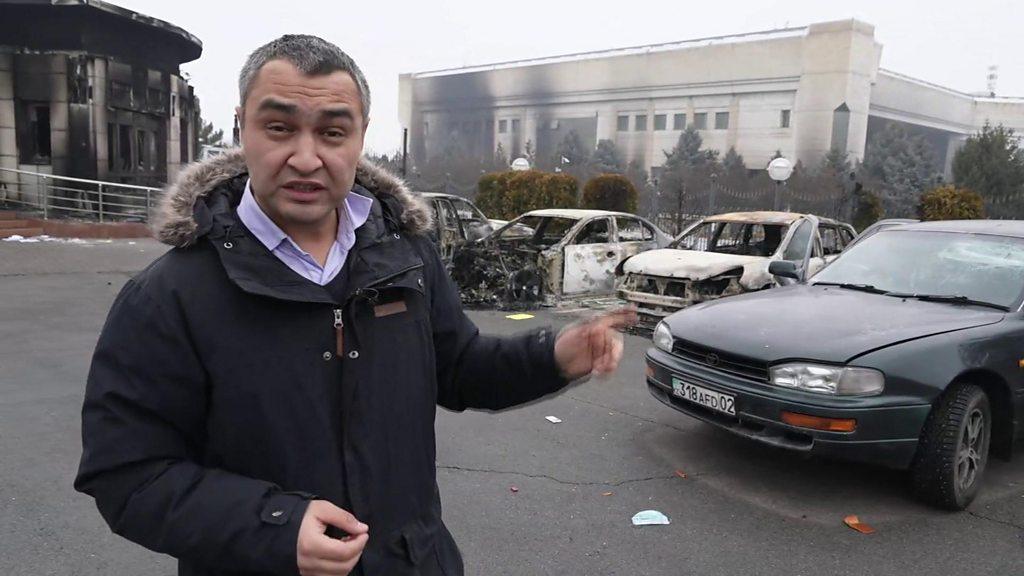Kazakhstan unrest: Blinken questions Russian troop deployment
- Published

Russian officials say the 2,500 strong force will only remain in Kazakhstan temporarily
US Secretary of State Antony Blinken has questioned Kazakhstan's decision to seek Russian military aid to deal with an ongoing wave of violent unrest.
Dozens of people have been killed in protests triggered by a rise in fuel prices, but Mr Blinken said the US believes that the Kazakh government can deal with the protests itself.
He told reporters that it was unclear why the deployment was happening.
The first of about 2,500 Russian-led troops have arrived in Kazakhstan.
Officials in Moscow have emphasised that the deployment of its forces under the Collective Security Treaty Organization (CSTO), a Eurasian military alliance of five former Soviet republics and Russia, is temporary.
Watch: The BBC's Abdujalil Abdurasulov hears gunfire as he visits the scene of clashes in Almaty
President Kassym-Jomart Tokayev made the request for assistance after protesters stormed the mayor's office in Kazakhstan's largest city, Almaty, and overran the city's airport.
But addressing reporters at a State Department briefing, Mr Blinken warned that "one lesson of recent history is that once Russians are in your house, it's sometimes very difficult to get them to leave".
"It would seem to me that the Kazakh authorities and government certainly have the capacity to deal appropriately with protests to do so in a way that respects the rights of protesters while maintaining law and order," Mr Blinken said.
"So it's not clear why they feel the need for any outside assistance. So we're trying to learn more about it."
Meanwhile, the US has authorised the departure of some non-essential staff from its consulate in Almaty amid safety concerns over the ongoing protests.
Some Russian paratrooper units have already arrived in the country, and on Friday assisted Kazakh forces in retaking the airport from protesters.
Kazakh troops have also taken firm action to regain control in Almaty. On Thursday, local media published videos showing government troops opening fire on protesters.
The Interior Ministry says 26 "armed criminals" and 18 security officers have been killed so far in the clashes and President Tokayev blamed what he called foreign "terrorists" for the unrest.
Mass protests broke out on Sunday when the cost of liquefied petroleum gas (LPG) - which many people in Kazakhstan use to fuel their cars - doubled.
The government has since said that fuel price caps will be restored for six months. But the announcement has failed to end the protests, which have broadened to include other political grievances.
There is no effective political opposition in Kazakhstan and most elections are won by the ruling party with almost 100% of the vote. The country's previous president, Nursultan Nazarbayev, ruled the country for 29 years and retained significant power since leaving office.
Mr Tokayev has now removed him as head of the country's security council.
It was also announced on Saturday that a former prime minister and security chief, Karim Massimov, had been arrested on Thursday on suspicion of treason, along with other officials.
No further details of the arrests have been given.

Kazakhstan: The basics
Where is it? Kazakhstan shares borders with Russia to the north and China to the east. It is a huge country the size of Western Europe.
Why does it matter? A former Soviet republic which is mainly Muslim with a large Russian minority, it has vast mineral resources, with 3% of global oil reserves and important coal and gas sectors.
Why is it making the news? Fuel riots, which have escalated to become broader protests against the government, have resulted in resignations at the top and a bloody crackdown on protesters.
BACKGROUND: Kazakhstan country profile
CONTEXT: Why is there unrest in Kazakhstan?

Related topics
- Published7 January 2022

- Published10 January 2022

- Published7 January 2022
